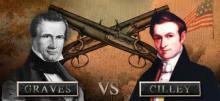We also miss the more entertaining parts of their discussions on who to screw first and how. Well, history provides us with some insight as to how these conversations are handled and to what degree a Congressional member will go to prove his or her point.
For example; did you know that the Honorable Representative from Kentucky, William J. Graves, and the Honorable Representative from Virginia, Henry Wise, were notified of a “breach of privileges” when Representative Graves killed the honorable Representative of Maine, Jonathan Cilley. Representative Graves and Representative Cilley held strong opposing positions during a debate which resulted in a duel. The result of the duel was not beneficial to Representative Cilley. Representative Wise also received the notification for performing as Representative Graves’ “second” during the duel. (February 24, 1838)
Did you also know that the Honorable Representative of California, Philemon Herbert was arrested for manslaughter on May 8, 1856? Representative Herbert maintained his position while sitting in prison before being acquitted in July, 1856.
Further, in 1866 the Honorable Representative of Kentucky, Lovell H. Rousseau, was decreed “disorderly of conduct” by the House after assaulting the Honorable Representative of Iowa, Josiah Grinnell with a cane. The assault of Representative Grinnell took place outside of the Capitol resulting from an insult spoken during a debate on the floor. The incident happened on June 14, 1866.
When one considers the long standing history of our country and how we elect to handle opposing viewpoints, is it any wonder nothing manages to be accomplished?
